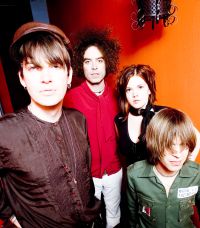
The Dandy Warhols
are a power pop band formed in Portland, Oregon in the mid-nineties.
Today, with ten years and a half-dozen albums behind them, the band’s
influence and popularity continues to grow.
The band is Courtney Taylor on vocals and guitar, Zia McCabe on
keyboard, Peter Loew on guitar, and Brent De Boer on drums. We caught up
to singer and songwriter Courtney Taylor to ask him about the band’s
steadily growing success, his experiences on stage and in the studio,
and his thoughts on Boston’s unique music scene.
BB: Could you state your name and occupation
for the record, please.
Courtney: Courtney Taylor… Rocker.
BB: The Dandy Warhols have managed to be a
successful working band for years and represent what a lot of musicians
just starting out want to be. What do you think contributes to that
success?
Courtney: Yeah, well, the main thing is our love of our music,
and our will to only make it the way we want to hear it, the way we need
it to be.
BB: Your biggest success has been in Europe.
What do you think is the difference between the music markets in Europe
and the US?
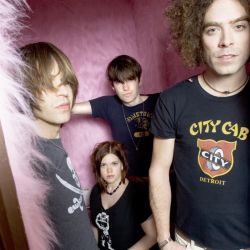 Courtney: What makes things happen like that, and why there are
“big in Europe” types of bands, and they’re generally a little more…
artistic, or they’re just more extremely “something”… is that radio
isn’t as rigidly formatted over there. Here we just spent ten years
where you could only sound like you descended from Green Day, Pearl Jam,
or the Beastie Boys. You had to be a Blink 182 or a Kid Rock, your rap
rock or whatever, and that’s music for twelve-year olds. America is
dominated by the twelve-year old, and the buying power of twelve-year
olds. So, you get Britney Spears being bigger than God. Over there it’s
not so much like that, other things show up on the radio. You can
actually just make music and if it’s good, it shows up on the radio, it
doesn’t have to be any kind of style. So, people have actually heard us
over there, whereas here, it’s basically college radio and file-sharing.
We’re as big over here as we are over there, but we’re just not as
visible here.
Courtney: What makes things happen like that, and why there are
“big in Europe” types of bands, and they’re generally a little more…
artistic, or they’re just more extremely “something”… is that radio
isn’t as rigidly formatted over there. Here we just spent ten years
where you could only sound like you descended from Green Day, Pearl Jam,
or the Beastie Boys. You had to be a Blink 182 or a Kid Rock, your rap
rock or whatever, and that’s music for twelve-year olds. America is
dominated by the twelve-year old, and the buying power of twelve-year
olds. So, you get Britney Spears being bigger than God. Over there it’s
not so much like that, other things show up on the radio. You can
actually just make music and if it’s good, it shows up on the radio, it
doesn’t have to be any kind of style. So, people have actually heard us
over there, whereas here, it’s basically college radio and file-sharing.
We’re as big over here as we are over there, but we’re just not as
visible here.
SONGWRITING AND INFLUENCES
BB: How do new songs usually come about?
Courtney: I smoke pot and lay on my sofa. That’s where songs come
from.
BB: And then you bring them to the band, and kinda hash out the
details?
Courtney: Yeah, and then the band is, you know, a super-jammy
band in a real traditional, like, textural jams, not riffs and noodling
out solos and leads and things. We can create textures, the band creates
textures around these song cores, and… that’s sort of how they happen,
sometimes. We just keep the chords revolving, and they evolve, the songs
become more than that.
BB: When did you write your first song?
Courtney: I don’t know, I was always a drummer. This is my first
band playing guitar and singing, but I’d always pick up little guitar
bits off of the guitarists in the bands I played in. So that’s how I
learned how, and I just had a need for music to sound a certain way and
do a certain thing, so I started collecting recording equipment years
ago when I was a teenager. Starting with a 4-track, and just growing
from there, making music for myself to listen to, at home by myself. And
so I pretty much had a fully developed sense of what I wanted by the
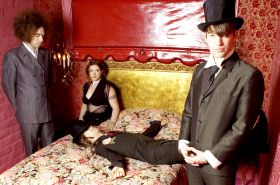 time I got talked into just – by Pete, my guitarist – got talked into
singing and playing guitar and just writing songs and doing that.
time I got talked into just – by Pete, my guitarist – got talked into
singing and playing guitar and just writing songs and doing that.
BB: So tell me about your songwriting style.
What do you think are your musical influences, and do you have a
description for it?
Courtney: I’ve spent my entire cognizant life, as long as I can
remember, aggressively pursuing the question “what the hell is music?”
Why am I moved by this song and not this song? Why are people moved by
certain songs and not others? Or, why is everybody moved by certain
songs, and nobody is moved by some songs, except the person that made
them. And I don’t really believe that my influences are, you know,
whatever, spiritualized. Queen, and all the things I listened to growing
up; I think my influences for what I create are more genetic.
BB: What kind of music have you been listening
to?
Courtney: You know, I just recently discovered the Spanish and
Basque Renaissances, Renaissancae? Whatever the fuck, “the Renaissance.”
Music from the Spanish Renaissance. In a language called Provençal. And,
it’s fucking amazing; it’s exactly what I do. Almost all of it. It’s the
first time I’ve ever found a style, or a scene, or a time or place or
sound that gives me what I want to hear happen, that just makes the hair
stand up on the back of my neck, and makes my head go crazy, and the
knot in my stomach. It’s really consistently gratifying to me, the music
from this era. It’s pretty much, harmonically, what my band does. Same
amount of chord changes, same types of chords, melodies, harmonies. Very
similar arrangements, it’s very euphoric, it’s cyclical. It’s all in a
canon form, is what they call it.
BB: Why do you think you’ve reacted to it so
much?
Courtney: That is it, is that it’s genetic. That there are
certain chords and harmonies that will move certain people a certain
way. Yeah, people tend to hear production, like, these songs are Dandy
Warhols songs, they’re 500 years old, sung in a dead language, only
scholars of this language speak this language anymore. Yet it is making
me feel like I’m gonna go crazy and my body is going to explode. I trap
myself in my car with it, just park somewhere and I just crank it.
BB: People reading this are gonna want to know
how to hear some of this music. Where would you direct them?
Courtney: The Shakespeare Festival [www.orshakes.org], in
Ashland, Or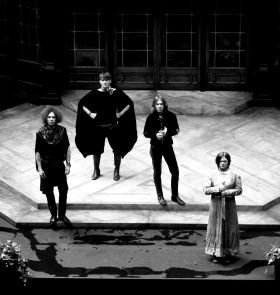 egon. The musicians that create all the music for that, they
make their own gut string guitars. I have a few pre-baroque collections,
and the ones that come out of Ashland, Oregon, are the best recordings,
the best production. They’re fantastic. But I mean, the thing is, this
is not electronic. I don’t know that anyone’s gonna really give a shit
about this music, because they’re gonna want to hear something they’re
used to. I think people tend to listen with their judgments of what is
supposed to be cool or acceptable to listen to, in a lot of cases, and
don’t really just listen. But for me, I understand music. I speak it
about as fluently as can reasonably be spoken, so, to me, if it’s
a lute or some ancient instrument, I don’t really care. I hear and feel
chord changes and harmonies more than anything. But if you’re looking
for it, try to track down music from Provence, the Renaissance,
Provençal. Renaissance. Try that.
egon. The musicians that create all the music for that, they
make their own gut string guitars. I have a few pre-baroque collections,
and the ones that come out of Ashland, Oregon, are the best recordings,
the best production. They’re fantastic. But I mean, the thing is, this
is not electronic. I don’t know that anyone’s gonna really give a shit
about this music, because they’re gonna want to hear something they’re
used to. I think people tend to listen with their judgments of what is
supposed to be cool or acceptable to listen to, in a lot of cases, and
don’t really just listen. But for me, I understand music. I speak it
about as fluently as can reasonably be spoken, so, to me, if it’s
a lute or some ancient instrument, I don’t really care. I hear and feel
chord changes and harmonies more than anything. But if you’re looking
for it, try to track down music from Provence, the Renaissance,
Provençal. Renaissance. Try that.
BB: The Dandy Warhols are largely known for
songwriting. What do you consider some of your biggest songs, and which
are you the most proud of, personally?
Courtney: Well, obviously “Junkie,” and “Bohemian Like You” are
two pretty big hits, internationally. The cult favorites, the ones that
everyone yells at the gigs that they want to hear are, like, the real
swirly cyclical trippers, like “Good Morning,” and “(Tony, This Song Is
Called) Lou Weed.”
BB: “Get Off” is a huge favorite of many.
Courtney: Yeah. I hear people yelling “Get Off.” I always just
figured they like yelling “get off.”
BB: No, I think they like the song.
Courtney: Okay. Yeah people go nuts. (Laughs.)
BB: Yeah they do.
Courtney: I don’t know, what I’m most proud of? That changes.
Track Two off of the new record is a beast. It’s one of my, it’s my
finest hour, “Love Is the New Feel Awful.”
BB: Nice.
Courtney: It’s one of those, it’s a real head-fucker.
RECORDING
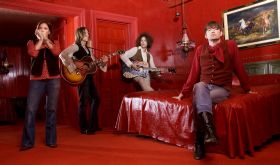 BB: How do you guys try to get your best stuff
down when recording an album?
BB: How do you guys try to get your best stuff
down when recording an album?
Courtney: It changes constantly. I do most of it laying on a
sofa. You know, I lay on sofas for a living. I kinda lay on one sofa,
write songs, move to another sofa, record ‘em, move to another sofa, lay
down the vocals. I really like the sofa.
BB: (Laughs)
Courtney: I have many sofas.
BB: What was it like working with Nick Rhodes
on Welcome to the Monkey House?
Courtney: We laid on the floor. Nick sits in the middle of the
floor, surrounded by keyboards and shit, like a child. His dad owned a
toy store, and he is forever that, he’s an elf, an actual elf. And a
child. And he just sits in the middle of the floor and we play with
instruments, and he gets excited and goes, “what did you think of that,
did you like that?” He has so many amazing old weird keyboards, and drum
machines, and effects and things.